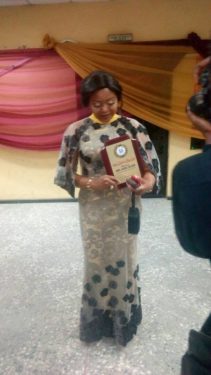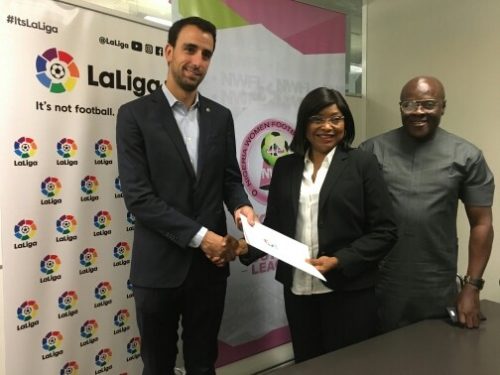It has been a year and two months since Mrs Aisha Falode was appointed Chairman of Nigeria Women Football League (NWFL) and there is no doubt that the women’s league has since experienced a new lease of life following her appointment.
The league which was previously marred by irregularities, experienced a smooth sailing season last year when she came on board as Chairman but this improvement hasn’t been without a few challenges.
“The challenge has been funding,” Mrs Falode said to Sola Oyeniyi of ACLSports on the difficulties experienced in the last one year.
“I keep telling people, we give a lot but our reward for performance is very low in terms of motivation. We are the only league that has produced quality players for the national team who have gone to do Nigeria proud, dominate Africa and they are making their presence felt in the world. Yet, the reward is very poor.
“They (female footballers) are under-valued and under-invested in. We really need the Nigeria Football Federation (NFF), corporate sponsors and partners to know that there is a lot of a leveraging room, there’s a lot of room for activation in women’s football,” she added.
Mrs Aisha also highlighted the importance of women in the society, how they nuture talents and should be encouraged to nurture theirs by giving them remuneration that is commensurate to their efforts. This, she says is fair play – the essence of football.
“The woman is an asset to the society. If you look at the population of Nigeria, we know half is under 30 and that under 30 also has half as women. So the woman has a strategic role in the society because she is first of all a daughter, a sister and a mother. Even in men’s football, without the support of their mothers a lot of our male footballers couldn’t have gone ahead to play football.
“The woman has a way to nurture talents and she also needs to be encouraged to nurture her own talent, to see the value in herself, to see the quality that she has and that is the message we are preaching. That these players are also breadwinners of their families. This is what they do for a living. So if you do not take care of their welfare, if you do not pay them the right wages that they deserve then it is unfair and football is about fair play,” she said.
“The playing field has to be fair, the remuneration has to be fair, the reward for performance has to be in equity. So we are now preaching gender equity in women’s football that there has to be parity in the reward system. That is what we want.”

On the issue of sponsorship which was addressed by the NFF first Vice-President, Barr. Seyi Akinwunmi at the NWFL congress in February; it was said that the problem is the perception of the sponsors about female football generally but that the NFF has ensured that every deal signed in recent times have included the option to sponsor female football. So he added that the board now have to provide an environment and avenue for the game to thrive and be attractive while the journalists have to provide extensive coverage of the league and bring it to the open to make it more financially viable.
When asked what was being done about that the Chairman said all of these have now been put in place because “the fans have returned to watch the women’s league, the matches are consistent, there are no walk-overs, you were at the Champions Shield and the Super 4: top quality football and top quality organisation, the press is also our family now, the league is being discussed on television, the women’s league is talked about in the world, we are enjoying space in the print and the social media is providing adequate coverage.
“Tell me what ingredient is missing and what we have not done?” she asked. “I just think it is a societal thing. It is a cultural thing that anything that women do is not appreciated well enough. The men have not put in half the effort we have put in to package the league and make it attractive.
“The other day at the Champions Shield a lot of people came to me and they were congratulating me that they haven’t seen this kind of organisation, ambience and branding put in place for a women’s league and for two champions to play for a champions trophy. It has never even happened in the men’s game.”
“Have you ever heard where the men’s league have played a champions shield?” Mrs Falode asked. “It has never happened, but we have to keep doing this activities to keep the women’s league on the front burner so that the sponsors can know that we have different activities,” she said.
“The other day we went to schools for a mentoring session with the girls so the girls can know they can’t focus on being a player alone that there are so many other career opportunities in football. Has it ever happened in the men’s league?
“So we have done everything humanly possible and we are just waiting, but we will push it again this season to make sure that what we did last season was not a flash in the pan, that we are going to be consistent with it and we are going to be deliberate and strategic with it and hopefully with some luck, the sponsors will start to look in and invest,” Mrs Falode said.
That said, the efforts of Mrs Aisha Falode to completely revamp the women’s game in Nigeria hasn’t gone unnoticed hence, the Memorandum of Understanding (MOU) signed with LaLiga Nigeria signed earlier in the year.

On the agreement she said: “It is a partnership and collaboration which would include: training, branding, marketing, television rights, how to get fans to the stadium, how to get our league on television, exchange programmes, our champions will go to Spain and play their champions and vice-versa. This is very key in terms of marketing to see that we have attracted people from outside Nigeria.
“The other day at the Legacy pitch, a Professor from the University of Florida came with four of her students from the United States because of what she heard we are doing with the women league. She toured about six women’s league venues to watch our teams play. You can see people from outside Nigeria are being attracted to our women’s league because they see the value in what we are doing. I just hope that our own people will open their eyes and see that there is great potentials in the women’s league and that there is great potentials for partnership and collaboration,” she concluded.
Mrs Falode then gave us a picture of her vision and dream for the Nigeria Women Football League.
“ln the nearest future, I want a women’s league that has a level playing field as the men, a women’s league that will enjoy the same pay parity as the men, a women’s league that will enjoy live coverage on television, a women’s league whose players will be happy to play at home rather than going abroad; because once our quality players are spotted by foreign clubs, the next season they are gone.
“We want a situation where other professionals and foreign players come to play in our league like we used to have when the women’s league first started and finally, a women’s league where every girl child will not only have a dream to play in the league but also do something to positively impact women’s football.”









